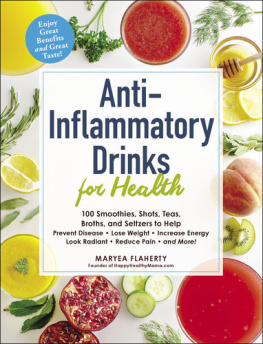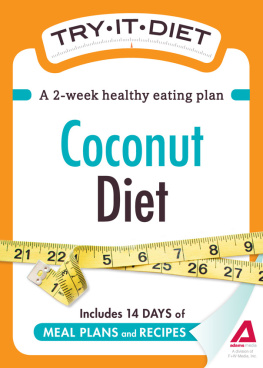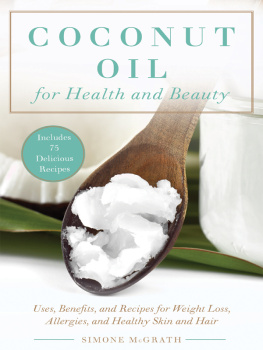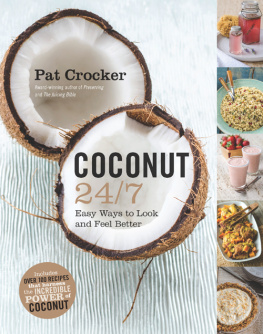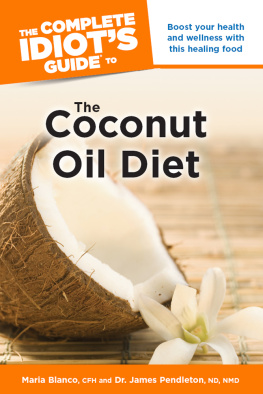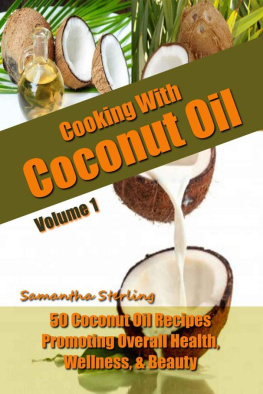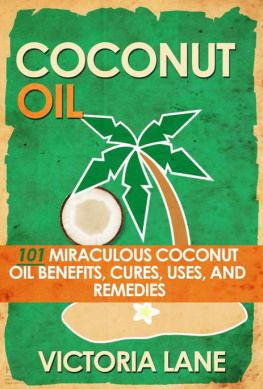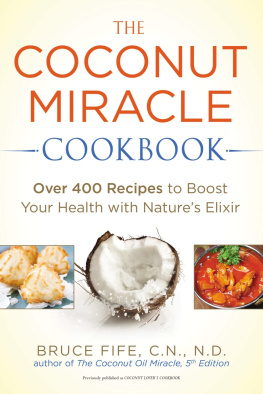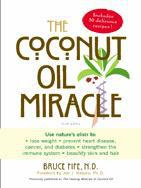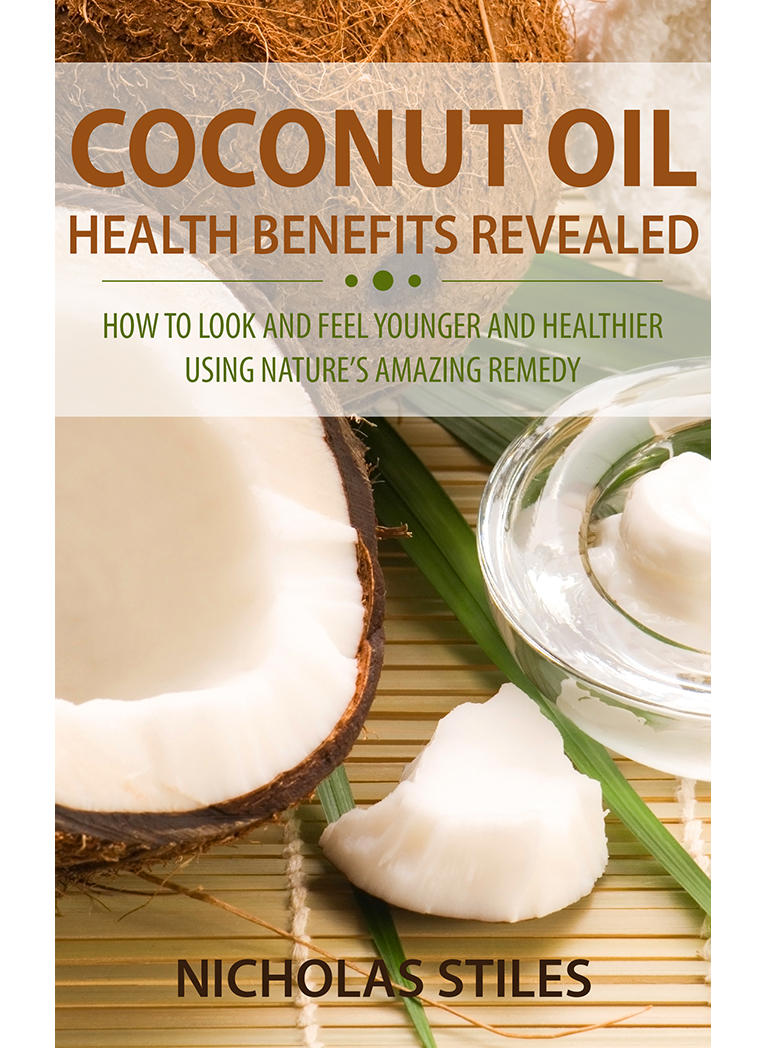Coconut Oil Health Benefits Revealed
How To Look And Feel Younger And Healthier Using Natures Amazing Remedy
By: Nicholas Stiles
About The Author

Nicholas Stiles is known to be a bit of a health nut as he spends a lot of time doing research and writing books on natural ways to get or remain healthy. His latest research process has him focusing on the numerous benefits of coconut oil.
Nicholas is aware that this is something that people hear about all the time but rarely take time to seriously think about. He has written this book to increase peoples awareness and focus on the benefits of including coconut oil in their diet, as it really plays an important role in the overall health of an individual.
Table of Contents
Publishers Notes
Disclaimer
This publication is intended to provide helpful and informative material. It is not intended to diagnose, treat, cure, or prevent any health problem or condition, nor is intended to replace the advice of a physician. No action should be taken solely on the contents of this book. Always consult your physician or qualified health-care professional on any matters regarding your health and before adopting any suggestions in this book or drawing inferences from it.
The author and publisher specifically disclaim all responsibility for any liability, loss or risk, personal or otherwise, which is incurred as a consequence, directly or indirectly, from the use or application of any contents of this book.
Any and all product names referenced within this book are the trademarks of their respective owners. None of these owners have sponsored, authorized, endorsed, or approved this book.
Always read all information provided by the manufacturers product labels before using their products. The author and publisher are not responsible for claims made by manufacturers.
Copyright Page
Coconut Oil Health Benefits Revealed, Copyright 2013 by Nicos Stylianou
All rights reserved. No part of this publication may be reproduced, stored in a retrieval system, or transmitted in any form or by any means, electronic, mechanical, recording or otherwise, without the prior written permission of the author.
FIRST PUBLISHED BY SPEEDY PUBLISHING LLC 2013
PRINT ISBN: 9781628841435
E-ISBN: 9781628841442
For corrections, book orders, bulk discounts, author appearances, inquiries or interviews, contact publisher by email or regular mail at:
Speedy Publishing, LLC
40 E. Main St., #1156
Newark, DE 19711
http://www.speedypublishing.co
Manufactured in the United States.
Dedication
This book is dedicated to my wife and my two boys who inspire me to stay healthy.
Introduction
Until recently, doctors usually recommended that their patients avoid coconut oil due to its high levels of saturated fat. Only a relatively small group of specialists in the field of lipids were aware that this plant-based oil actually offered a number of health benefits, including the ability to actually reduce heart disease risk. Now that we know saturated fat isnt always bad, new research offers a window into the many possible health benefits associated with coconut oil.
This simple fat has been shown to provide benefits for dry and brittle hair and irritated skin. It may also help reduce blood cholesterol levels, decrease your risk of high blood pressure and heart disease, and help people who are in danger of developing diabetes. The medium-chain fatty acids and other unique substances found in coconut oil have also been linked with improved cognition, better mental health, and even the ability to promote modest weight loss.
While this tropical oil may not be a miracle food, the evidence suggests that it may be an important part of any truly healthy diet. Simply switching from conventional processed oils to minimally-treated coconut oil could be a huge help for your body. This book will show you how to find the right oil for optimum health, while teaching you all about its history, production and possible health benefits. Youll even get to read about some case studies of people just like you who found themselves feeling better and stronger after they started using coconut oil in their day to day diets.
Whether youre hoping to reduce your risk of serious diseases such as diabetes and hypertension or you just want to include healthy natural ingredients in your diet, its worth taking a look at coconut oil. Its a satisfying, health-promoting food that tastes great and works well in a wide variety of foods. That makes it worth a try!
Chapter 1- What You Should Know About Coconut Oil-Basic Facts
Where Coconut Oil Comes From
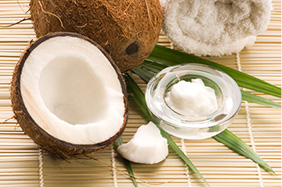
As its name implies, coconut oil comes from the meat of coconuts, but not just any coconut will do. This substance can only be pressed from the shredded kernel of mature nuts, since green coconuts are soft and jelly-like inside. Growers can tell a coconut is white when the husk is brown and the shell inside becomes dry and hairy. When shaken, these mature coconuts slosh gently, while a green nut makes no sound.
Coconut palms can be grown around the world in a wide variety of locations, as long as they are planted in tropical conditions. Temperatures below freezing will injure or even kill the trees. Otherwise, coconut palms are very hardy and can withstand direct sun, high heat and even salt spray. Any given jar of coconut oil may contain oil from trees grown in Southeast Asia, Central America, parts of Africa and Australia, or even US plantations in Hawaii and southern Florida.
Harvesting and Processing
Production of coconut oil starts with the harvest. In most parts of the world, growers can pick ripe coconuts throughout the year. In India, the trees are harvested between two and six times a year, but in parts of Africa, they can pick up to twelve times in any given growing season. The nuts are stored in the shade and husked a few days after picking. The husks may be discarded or used to make coconut fiber for home dcor and garden use.
Once the husks have been removed, the nuts can be cracked and the meat is removed for shredding. Some growers extract coconut oil from the meat via a dry process. This involves letting the meat sit in direct sun or placing it in a kiln to dry. This produces a material called copra, which can be stored for long periods of time. The copra can be pressed to extract the oil, or treated with solvents to separate the fat from the meat. Dry processing leaves behind a lot of coconut mash, which is traditionally fed to cattle and other livestock.
Another option is wet processing. This method of extracting coconut oil involves shredding the fresh raw coconut to create an oil-water emulsion. The oil is then removed from the mixture using either the chemical hexane or pressing or milling the material. Wet processing yields about 15 percent less oil than dry processing, but the remaining coconut mash is more useful for human consumption.
Once the oil has been removed from the coconut, it often goes through more treatments to make it more attractive and appealing. Most of the coconut oil on the market is called RBD oil, or refined, bleached and deodorized. This material is filtered and heated to stabilize it and remove any coconut smell or flavor. It can be used in a wide variety of cooking applications and is good for people who dont like the taste of coconut, but it lacks some of the nutrients that make coconut oil so healthy. In many cases, the RBD oil will be partially or fully hydrogenated to give it a higher melting point for use in warm climates.


